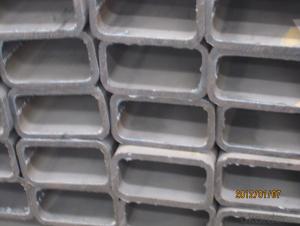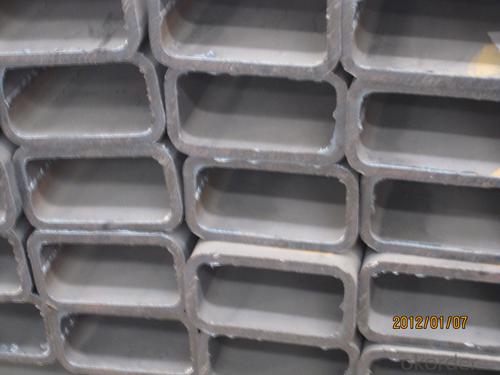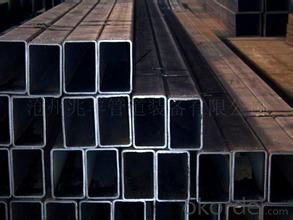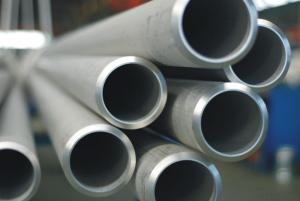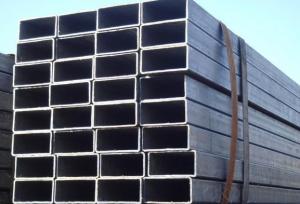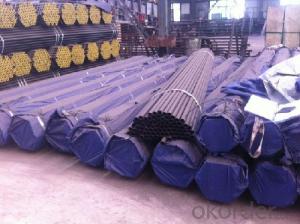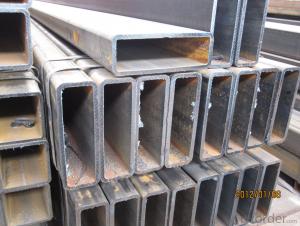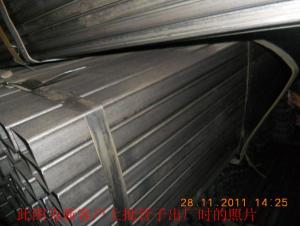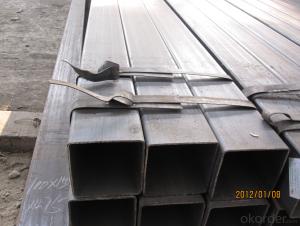Rectangular Hollow Hot Sale Section
- Loading Port:
- China Main Port
- Payment Terms:
- TT or LC
- Min Order Qty:
- 25-35 m.t.
- Supply Capability:
- -
OKorder Service Pledge
OKorder Financial Service
You Might Also Like
1.Quick Details
Thickness: | 1.0 - 35 mm | Section Shape: | Square | Outer Diameter: | 20*20-600*600 |
Place of Origin: | Shandong China (Mainland) | Secondary Or Not: | Non-secondary | Application: | Structure Pipe |
Technique: | Cold Rolled | Certification: | CE | Surface Treatment: | oil,paint |
Special Pipe: | Thick Wall Pipe | Alloy Or Not: | Non-alloy | Name: | Square Hollow Steel Pipe/Tube |
Shape: | Square/Rectangular | Yield Strength: | 360-380Mpa | Tensile Strength: | 560-580Mpa |
Elongation: | 24-28% | Bend Test: | Qualified | Impact Value: | V-notch |
Grade: | 20#,45#,16Mn,A210,St45,Q235,Q345,Q195,Q215,10#-45#,A53-A369,ST35-ST52,Q195-Q345 | Standard: | JIS G3465-2006,JIS G3466,GB/T 3094 |
2.Specifications
1. OD:15X15-800X800MM,20X30--600X800MM
2. Thick.:1.0--35.0MM
3.FAQ of Rectangular Steel Tube
①How is the quality of your products?
Our products are manufactured strictly according to national and internaional standard, and we take a test
on every pipe before delivered out.
②How about price?
Yes, we are factory and be able to give you lowest price below market one, and we have a policy that “ for saving time and absolutely honest business attitude, we quote as lowest as possible for any customer, and discount can be given according to quantity.
③Why should you chose us?
Chose happens because of quality, then price, We can give you both.Additionally, we can also offer professional products inquiry, products knowledge train(for agents), smooth goods delivery, exellent customer solution proposals.Our service formula: good quality+good price+good service=customer’s trust
SGS test is available, customer inspection before shipping is welcome, third party inspection is no problem.
If you have any question, pls feel free to contact us !
4.Rectangular Hot Rolled Steel Tube Image
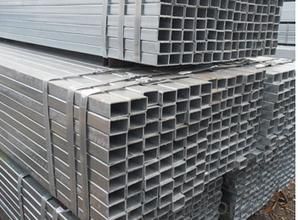
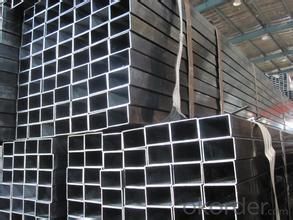
- Q: How can the immersed pipe pile put steel cage into the steel pipe? Which expert to answer?
- Pile: refers to the use of hammer piling method and pile vibration method, steel casing with valve type pile tip or precast reinforced concrete pile boots into the soil, then pouring concrete (or first in the tube into the cage), while hammering or vibration of a pile side pull tube. The former is called hammer sinking pipe cast-in-place pile, and the latter is called vibrating sinking pipe cast-in-place pile.
- Q: What is the thermal expansion coefficient of steel pipes?
- The thermal expansion coefficient of steel pipes varies based on the particular steel type and the temperature range in which the expansion is measured. On average, the thermal expansion coefficient of steel pipes is between 10-14 x 10^-6 per degree Celsius (10-14 μm/m°C). Thus, for each degree Celsius rise in temperature, the length of a steel pipe will roughly increase by 10-14 μm per meter. It is vital to acknowledge that this value is an average and may slightly differ based on the specific composition and treatment of the steel employed in the pipe.
- Q: Can steel pipes be used for sewage and wastewater systems?
- Yes, steel pipes can be used for sewage and wastewater systems. Steel pipes are highly durable, resistant to corrosion, and can withstand high pressure and temperature conditions, making them suitable for transporting sewage and wastewater efficiently and securely. Additionally, steel pipes have a long lifespan and can handle the abrasive nature of sewage and wastewater, making them a reliable choice for such systems.
- Q: What are the different methods of welding steel pipes?
- There are several different methods of welding steel pipes, including shielded metal arc welding (SMAW), gas tungsten arc welding (GTAW), gas metal arc welding (GMAW), flux-cored arc welding (FCAW), and submerged arc welding (SAW). Each method has its own advantages and is used depending on factors such as the thickness of the pipes, the type of steel being welded, and the desired outcome.
- Q: How are steel pipes classified based on their end connections?
- Steel pipes can be classified based on their end connections into three main categories: threaded, socket-weld, and butt-weld.
- Q: How do steel pipes handle high-velocity flow?
- Steel pipes are designed to handle high-velocity flow efficiently due to their inherent strength and durability. The smooth interior surface of steel pipes minimizes friction, allowing for smooth flow and reducing energy loss. Additionally, the sturdy construction of steel pipes enables them to withstand the pressures and forces exerted by high-velocity flow without deformation or failure.
- Q: What is the difference between hot-dipped galvanized and electro-galvanized steel pipes?
- Both hot-dipped galvanized and electro-galvanized steel pipes undergo a galvanization process to protect them from corrosion. However, there are distinct differences between the two methods. Hot-dipped galvanized steel pipes are immersed in molten zinc, resulting in a thick zinc coating on the steel's surface. This creates a durable and long-lasting barrier against corrosion. The thickness of the zinc coating varies, but it is generally thicker than that of electro-galvanized steel pipes. In contrast, electro-galvanized steel pipes are coated with a thin layer of zinc through an electroplating process. This involves passing an electric current through the pipes while they are submerged in a zinc solution. The zinc particles are then deposited onto the steel's surface, creating a thin and uniform protective layer. One key difference is the thickness of the zinc coating. Hot-dipped galvanized steel pipes have a thicker and more robust coating, making them suitable for harsh environments or exposure to corrosive materials. Another distinction is the appearance of the pipes. Hot-dipped galvanized steel pipes typically have a dull grayish finish, while electro-galvanized steel pipes have a smoother and more polished look. In terms of cost, electro-galvanized steel pipes are generally more economical because the electroplating process requires less labor and zinc. Ultimately, the choice between hot-dipped galvanized and electro-galvanized steel pipes depends on the specific application and desired level of corrosion resistance. Hot-dipped galvanized steel pipes are typically used in demanding environments, while electro-galvanized steel pipes are suitable for less corrosive applications where cost-efficiency is important.
- Q: Which is cheaper, angle iron or steel pipe?
- Angle iron and steel pipe, angle iron is cheap.
- Q: Can steel pipes be used for high-temperature applications?
- Yes, steel pipes can be used for high-temperature applications. Steel is known for its excellent strength and durability, making it suitable for handling high temperatures. However, the specific grade of steel used and the operating conditions must be considered to ensure it can withstand the desired temperature range without compromising its structural integrity.
- Q: How are steel pipes protected against microbial corrosion?
- Steel pipes are protected against microbial corrosion through various methods. One common method is the use of coatings on the pipe's surface. These coatings act as a barrier between the steel and the surrounding environment, preventing the entry of microbes and their corrosive byproducts. Coatings such as epoxy, polyethylene, and fusion bonded epoxy are often applied to the pipes to provide this protection. Another method is the use of corrosion inhibitors. These inhibitors are added to the fluid flowing through the pipe to inhibit microbial growth and prevent corrosion. These inhibitors can be organic or inorganic compounds that work by either killing the microbes or inhibiting their metabolic activity. Additionally, proper maintenance and cleaning of the pipes are crucial in preventing microbial corrosion. Regular inspections and cleaning can help remove any biofilms or microbial deposits that may have formed on the pipe's surface. This reduces the potential for microbial corrosion and extends the lifespan of the pipes. In some cases, cathodic protection may also be employed. This involves the use of sacrificial anodes or impressed current systems to provide a protective electrical current to the pipe. This current helps to prevent the formation of corrosive microorganisms and protects the steel from corrosion. Overall, a combination of coatings, corrosion inhibitors, regular maintenance, and cathodic protection techniques are used to protect steel pipes against microbial corrosion. These strategies help to ensure the longevity and integrity of the pipes in various industries, such as oil and gas, water supply, and sewage systems.
Send your message to us
Rectangular Hollow Hot Sale Section
- Loading Port:
- China Main Port
- Payment Terms:
- TT or LC
- Min Order Qty:
- 25-35 m.t.
- Supply Capability:
- -
OKorder Service Pledge
OKorder Financial Service
Similar products
Hot products
Hot Searches
Related keywords
